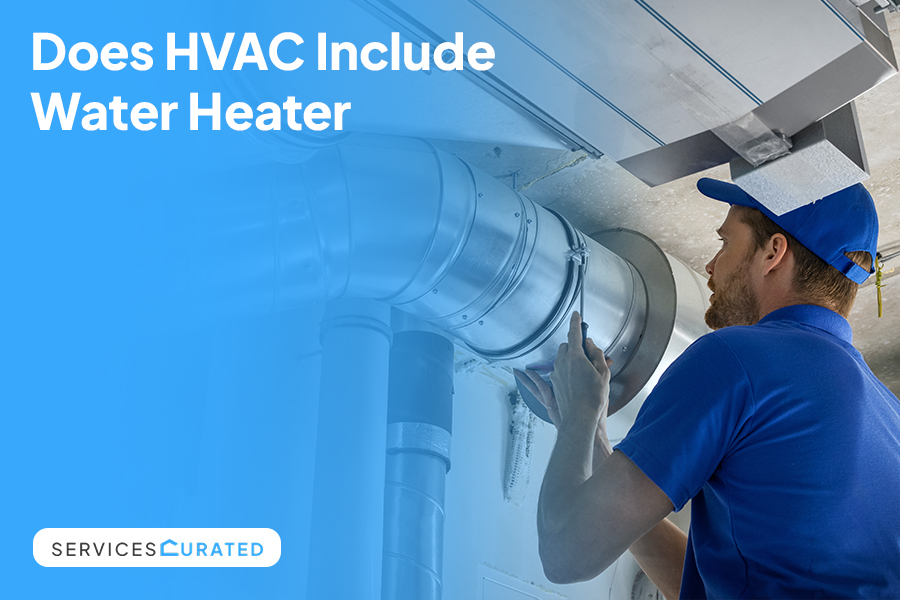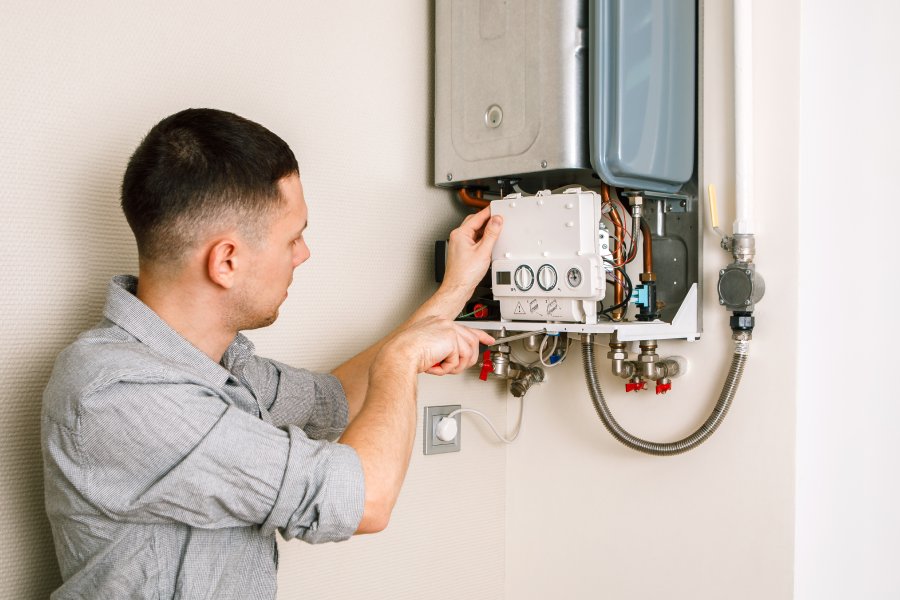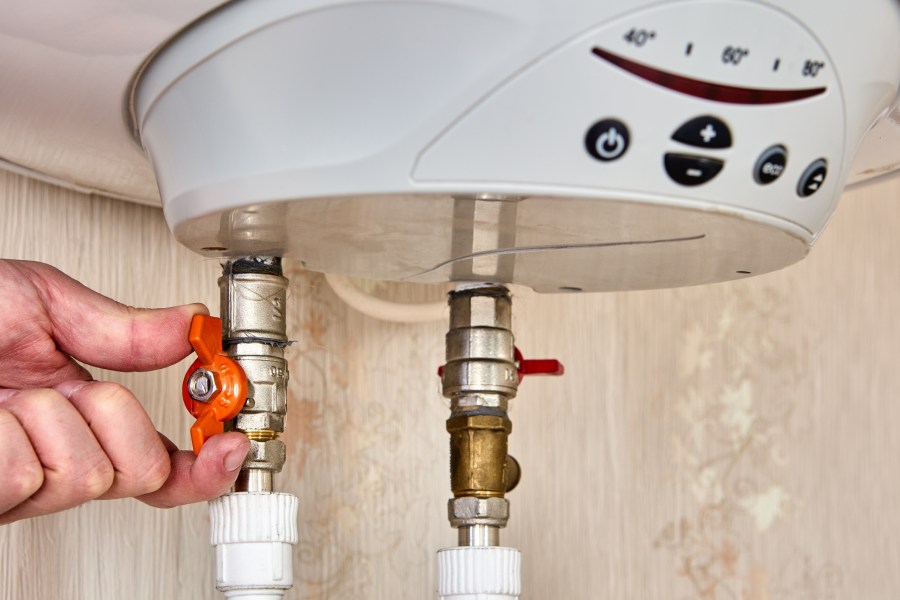Does HVAC Include Water Heater?

HVAC systems are indispensable for home comfort and efficiency. These intricate components regulate indoor temperatures, enhance air quality, and ensure a comfortable living environment. As you become more knowledgeable about the systems, you may question the role of HVAC, such as does HVAC include water heater?
In this exploration, we’ll break down the roles of HVAC systems and water heaters, as well as clarify whether they overlap or remain separate in home comfort. Without further ado, let’s get started!

Does HVAC Include Water Heater?
No, HVAC systems do not include water heaters. HVAC systems focus on controlling indoor air temperature and maintaining air quality. Water heaters are separate units designed specifically for heating water for household tasks like bathing, cooking, and cleaning.
While traditional HVAC systems handle air heating and cooling, some integrated systems, such as combination boilers or heat pump water heaters, can provide space heating and hot water. However, water heaters are generally considered part of the plumbing system rather than the HVAC system.
Defining HVAC Systems
HVAC stands for Heating, Ventilation, and Air Conditioning. These systems form the core of indoor climate control, managing temperature, humidity, and air quality in buildings to ensure comfort and health.
HVAC systems primarily heat spaces using furnaces or heat pumps, ventilate by circulating and filtering air and cool through air conditioning units. They work in tandem to maintain optimal indoor environments year-round.
Is a water heater HVAC or plumbing?
Water heaters often confuse homeowners and professionals due to their dual heating and water distribution nature. Generally, they’re considered part of the plumbing system rather than HVAC, primarily because their main function is to heat and distribute water through a building’s plumbing network.
Typically, plumbers install and maintain water heaters as they’re integral to the plumbing infrastructure. These devices connect directly to water supply lines and drainage systems, further cementing their classification as plumbing components.
However, some overlap exists, as HVAC technicians may work with water heaters in certain scenarios. This is especially true for integrated systems where water heating combines with space heating, such as in boiler or hydronic heating setups.
Typical Components of HVAC Systems
Heating systems
Heating systems are vital for maintaining home comfort, especially in colder climates. The three most common types are furnaces, heat pumps, and boilers, each with a distinct method of generating and distributing warmth.
Available in gas and electric models, furnaces are designed to heat air and circulate it through ductwork. Gas furnaces burn natural gas or propane, while electric furnaces use heating elements to achieve the same goal. Both types efficiently deliver warm air throughout the home.
In contrast, heat pumps provide heating and cooling by transferring heat between indoor and outdoor environments. This dual functionality makes them versatile and energy-efficient.
Conversely, boilers heat water to create steam or hot water. This steam or hot water is then distributed through pipes to radiators or radiant floor systems, offering a steady and consistent heat source throughout the home.
Ventilation systems
Ventilation systems are essential for ensuring indoor air quality and comfort. They come in various types and circulate fresh air throughout a building, removing stale air, moisture, and pollutants.
Key components of these systems include ductwork, air handlers, and exhaust fans. Ductwork acts as the building’s circulatory system, directing air to and from various areas.
In addition, air handlers are crucial for moving and conditioning the air within the system. Meanwhile, exhaust fans—commonly found in bathrooms and kitchens—help eliminate excess moisture and odors, promoting a healthier indoor environment.
Air conditioning systems
Air conditioning systems are crucial for ensuring comfort during the warmer months. They function by removing heat and humidity from indoor air, and various types cater to different needs and settings.
Central air conditioners are prevalent in many homes and operate using a split system that includes an outdoor compressor unit and an indoor evaporator coil. These systems efficiently cool air and distribute it through ductwork, delivering consistent cooling throughout the house.
For homes lacking existing ductwork, ductless mini-split systems provide a versatile solution. These systems consist of an outdoor compressor and one or more indoor air-handling units. Heat pumps also offer heating and cooling capabilities by reversing their operation with the seasons.
Water Heaters in Relation to HVAC
Standalone water heaters
Traditional water heaters are standalone units that heat and store water for household use. They operate independently of the HVAC system, which handles climate control, focusing solely on delivering hot water for taps, showers, and appliances.
There are two main types of conventional water heaters: tank and tankless. Tank heaters store hot water in large, insulated cylinders, ensuring a continuous supply. On the other hand, tankless units heat water on demand as it passes through the system, providing hot water only when needed.
Common types of standalone water heaters
Gas water heaters using natural gas or propane are typically more energy-efficient than electric models. Electric water heaters, in contrast, rely on heating elements to warm water.
For those seeking a space-saving option, tankless water heaters are available in both gas and electric versions. These models heat water on demand, offering efficiency for many households. However, it’s important to note that tankless heaters might struggle to meet high-demand needs when multiple outlets are used simultaneously.
Integrated systems
Combination boiler systems
Combination boilers are versatile systems that efficiently provide space heating and hot water. By heating water directly from the main supply, they offer instant hot water whenever you turn on the taps and circulate warm water through radiators or underfloor pipes for space heating.
This design saves space by eliminating the need for separate water tanks. It enhances energy efficiency by heating water only when needed, reducing standby heat loss typical of traditional storage tanks.
Despite these advantages, combi boilers have some limitations. They may struggle to meet the hot water demands of larger households with multiple simultaneous usage points. Additionally, while installation costs can be higher, long-term energy savings and the benefits of a more compact system often balance these expenses.
Heat pump water heaters
Heat pump water heaters use electricity to move heat instead of generating it directly. They extract heat from the air or ground to warm water and can sometimes integrate with HVAC heat pump systems to enhance overall efficiency.
These heaters operate like refrigerators in reverse, pulling heat from the surrounding air and transferring it to a water storage tank. In some configurations, they can be linked to ground-source heat pumps, providing consistent efficiency throughout the year.
While heat pump water heaters are highly energy-efficient and can significantly lower utility bills, they come with a higher upfront cost and require more space for installation. Plus, their efficiency might decrease in very cold climates, which is an important consideration depending on your local weather conditions.

Hydronic heating systems
Hydronic heating systems provide warmth by circulating hot water from a boiler through a network of pipes. This water flows to baseboards, radiators, or radiant floor systems, ensuring a consistent and even temperature throughout the home.
These systems are praised for delivering uniform heat and enhanced comfort. When combined with modern, high-efficiency boilers, hydronic heating can be highly efficient and allows for precise zoned temperature control.
Still, hydronic systems have some drawbacks. Their installation can be complex, particularly in homes not originally designed for this type of heating. Also, the initial costs can be higher than forced-air systems, although potential long-term energy savings may balance this.
Conclusion
So, does HVAC include water heater? While HVAC systems are crucial for regulating indoor air temperature, ventilation, and air quality, they do not typically include water heaters.
HVAC systems focus on heating and cooling air, whereas water heaters are dedicated to providing hot water for household needs, such as bathing and cooking. Water heaters are generally part of the plumbing system.
However, some integrated systems like combination boilers and heat pump water heaters can serve dual functions, providing space heating and hot water. That said, understanding the distinction between these systems can help you make informed decisions about their home comfort and efficiency needs.
